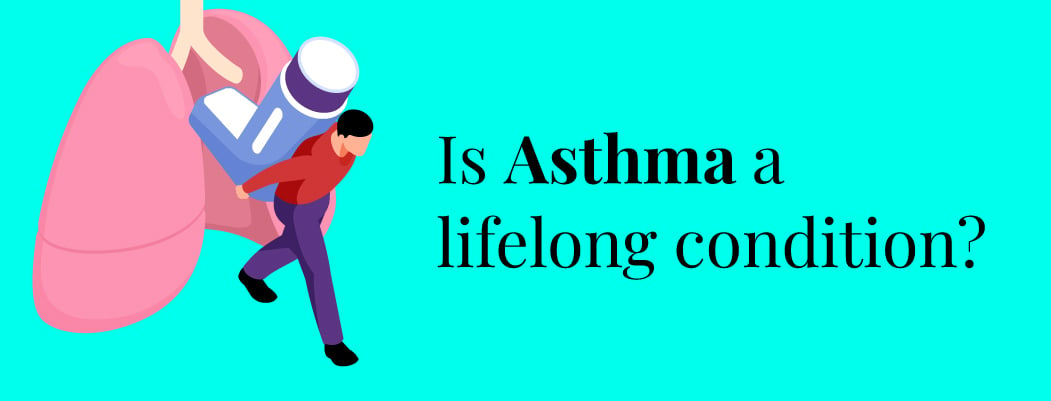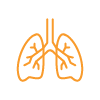Is Asthma Curable?
December 1, 2022

Overview of Asthma
An inflammatory condition that affects the lungs’ airways is called asthma. In addition to making breathing tough, it may also cause some physical tasks difficult or even impossible. Understanding a little about how breathing works is crucial to comprehend asthma. In a typical breathing pattern, air passes through your nose or mouth, descends into your throat, enters your airways, and eventually reaches your lungs.
Your lungs include a large number of tiny airways that assist in delivering oxygen from the surrounding air to your bloodstream.
Asthma symptoms develop when the muscles surrounding your airways constrict and your airways’ lining expands. In addition, the air passing through is further diminished as mucus fills the airways.
Bronchial asthma, allergic asthma, non-allergic asthma, occupational asthma, and cough-variant asthma are various forms of asthma. Childhood asthma and adult-onset asthma are two other types of asthma.
Symptoms of asthma
Wheezing is the most typical asthmatic symptom. When you breathe, you may hear a whistling or screaming sound.
Other signs could be:
- Coughing, particularly at night when laughing, or during exercise
- Chest pain
- Difficulty speaking
- Anxiety or panic
- Exhaustion
- Fast breathing, and heartache
- Infection outbreaks
- Sleeping issues
Symptoms you encounter may depend on the type of asthma you have. Some people have symptoms that last throughout the day. Some people can discover that particular activities exacerbate their symptoms.
Also, remember that even with proper management of your asthma, symptoms may still occasionally flare up.
Some indications of an asthma attack include:
- Coughing
- Throat clearing
- Wheezing
- Difficulty sleeping
- Tiredness
- Stiffness or chest pain
If you experience any of the following signs of an asthma emergency, you should also get medical attention:
- Tough breathing
- Gasping for air
- Confusion
- Bluish fingernails or lips
- Wooziness
- Trouble moving or speaking
Asthma: What’s the cause?
Numerous circumstances bring on asthma. It might be hereditary or genetic, handed down from one generation to the next, or due to previous episodes of severe chronic viral infections. In addition, hygiene may also be a factor, given that the child is exposed to microorganisms from a young age.
Does Asthma Have a Cure?
Although asthma is a highly treatable condition, there is currently no long-term cure. Even though asthma is a permanent illness, a healthy life is still achievable. You can lessen the effects of asthma by using effective treatments and modifying your lifestyle. According to many doctors, asthma treatments work effectively, and some patients have almost perfect symptom control.
Managing asthma
Once diagnosed, you must manage your condition by sticking to the recommended medication regimens. Asthma symptoms and severity vary. You can prevent asthma episodes by actively managing your therapy and improving your long-term asthma management. In addition, keeping track of the treatment would be helpful.
Monitor your signs
With the assistance of your doctor, draft a plan. Then, every day, record your symptoms in a journal. Keep track of the number of puffs you took and when you need an inhaler. If you notice any variations in your asthma symptoms, such as changes in the colour of your phlegm, note them down. Record your lungs’ health by performing two breathing tests regularly. You can control asthma with the aid of routine testing and record-keeping.
Peak flow: Using this device, you can gauge how quickly you can release air from your lungs. You can use this to monitor how well your lungs are working.
Spirometry test: Using a spirometer machine, you may determine how long your lungs can hold onto the air.
Adapt the treatment in accordance with the asthma action plan:
Making decisions regarding a change in therapy will be aided by keeping track of the symptoms, routine exams, and effects of asthma on your everyday activities. To assess whether your asthma is under control, the chart is helpful. Then, depending on where the asthma control appears on the chart, you can sit down with your doctor and discuss any necessary changes to your treatment.
Management and prevention
It’s difficult to know how to prevent asthma because experts haven’t yet pinpointed the exact cause of the inflammatory disorder. On the other hand, there is more information on preventing asthma attacks. These techniques consist of the following:
- Preventing triggers Avoid substances, odours, or items that have made it difficult to breathe in the past.
- Minimising contact with allergens Avoid allergens that you’ve found to cause asthma attacks, such as dust or mold.
- Taking allergy medication. One form of treatment that could influence your immune system is allergen immunotherapy. Your body may grow less sensitive to any triggers you experience if you receive shots regularly.
- Using medicine as a preventative. Your doctor can give you daily pharmaceutical prescriptions.
Home Treatments for Asthma
On the treatments to cure asthma, there is little study or information is available. As a result, there are no surefire home remedies for curing asthma. Still, you can use any of these complementary therapies in conjunction with the medicines that have been prescribed to reduce asthma episodes.
Dietary change: Asthma symptoms can get worse if you have food allergies. Keeping track of such food items is necessary. Additionally, obesity might aggravate asthma. Vitamin C and E-rich fruits and vegetables can aid in lessening inflammation around the airways.
Caffeinated tea or coffee: Caffeine, a bronchodilator that causes respiratory muscle exhaustion, is present in both beverages. Up to a certain point after ingestion, it aids in enhancing the function of the airways.
Yoga and breathing exercises: Attacks are less frequent when you do yoga and breathing exercises. As it elevates carbon dioxide levels in the body, slow, moderate breathing helps to lessen asthma symptoms. On the other hand, yoga improves your flexibility and lowers your stress levels, which can help prevent asthma attacks.
Lavender oil: Lavender oil has anti-inflammatory qualities that benefit persons with asthma and lessen allergy-related inflammation.
Ginger and garlic: Since asthma is anti-inflammatory, eating either of these foods can help. The anti-inflammatory effects of ginger and garlic reduce asthmatic symptoms.
Honey: Honey can be used as a cough suppressant and throat soother in cold treatments. It is strongly advised to take honey with hot water to treat asthma symptoms.
Who do you consult for asthma?
Diseases of the lungs and respiratory system are the focus of the field of pulmonology. Pulmonologists are doctors who specialise in this field.
People also ask
1. Can you be around someone with tuberculosis?
Understanding that TB bacteria cannot be immediately transferred from one person to another after exposure is crucial. The only people who transmit TB bacteria to others are those with the disease. You would need to breathe in TB bacteria and get the disease before you could distribute it to others.
2. How long does asthma take to cure?
To fully recover, it could take several days or even weeks.
3. Is asthma a lifelong condition?
Asthma is a dangerous, perhaps fatal, chronic condition (or lifelong). Asthma has no known treatment. The good news is that you or a loved one with asthma can have a regular, healthy life with adequate care.
4. What are the first warning signs of asthma?
Breathing difficulty Discomfort in the chest. When children have asthma, wheezing during exhaling is a typical symptom. Shortness of breath, coughing, or wheezing causing difficulty sleeping. Episodes of coughing or wheezing are made worse by a respiratory illness, such as the flu or a cold.
5. How can you treat asthma?
Asthma currently has no known cure; however, medication can help manage the symptoms so you can lead a regular, active life. The major form of treatment is inhalers, which are tools that allow you to breathe in medication. You could also need tablets and other treatments if your asthma is severe.








